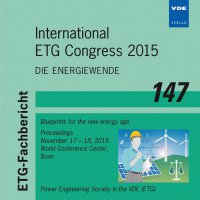Modelling, Planning, Design and Evaluation of DC-Distribution Grids
Konferenz: International ETG Congress 2015 - Die Energiewende - Blueprints for the new energy age
17.11.2015 - 18.11.2015 in Bonn, Germany
Tagungsband: International ETG Congress 2015
Seiten: 7Sprache: EnglischTyp: PDF
Persönliche VDE-Mitglieder erhalten auf diesen Artikel 10% Rabatt
Autoren:
Echternacht, David; Priebe, Jens; Wiernes, Pablo; Moser, Albert (IAEW RWTH Aachen University, Germany)
Stagge, Hanno (Flexible Elektrische Netze (FEN) Consortium RWTH Aachen University, Germany)
Jagielski, Kai; Petri, Anne-Kathrin; Drießen, Sarah (femu Uniklinik RWTH University, Germany)
Trevisan, Bianka; Digmayer, Claas; Jakobs, Eva-Maria (HCIC/TLTK RWTH Aachen University, Germany)
Oberst, Christian (FCN RWTH Aachen University, Germany)
Keysselitz, Baerbel (IPW RWTH Aachen University, Germany)
Kremer, Martin; Frenz, Martin (IAW RWTH Aachen University, Germany)
Sieber, Sandra; Lohrberg, Frank (LA RWTH Aachen University, Germany)
Krapp, Stefan; Wachten, Kunibert (ISL RWTH Aachen University, Germany)
Inhalt:
In October 2014 the Research Campus Future Electrical Networks, funded by the Federal Ministry of Research and Education with around 10 million € over the next 5 years, was started at RWTH Aachen University. Focus of research is the utilization of dc-technology for electrical (distribution) grids. The publicly funded Research Campus consists of four different projects, which are closely cross-linked. Within one of these projects a research demonstration medium-voltage dc-grid is to be built by connecting several test benches in the megawatt range, other projects focus on control and automation as well as devices and grid technologies. This paper will present the project “Modelling, Planning, Design and Evaluation of dc-Distribution grids” which focuses on the development of network planning tools for dc and hybrid distribution grids as well as related interdisciplinary topics such as acceptance, electromagnetic compliance landscape and urban planning. Due to the interdisciplinary approach the project consortium consists not only of institutes from the Faculty of Electrical Engineering, but also of institutes focusing on political science, landscape architecture, urban planning, medicine, ergonomics, and technical communication. Under the project lead of the Institute of Power Systems and Power Economics (IAEW) at RWTH Aachen University they work closely interconnected in order to facilitate an interdisciplinary exchange and interaction. This paper will give a detailed overview on the different work packages of the project as well as on the project targets and the chosen methodologies.


